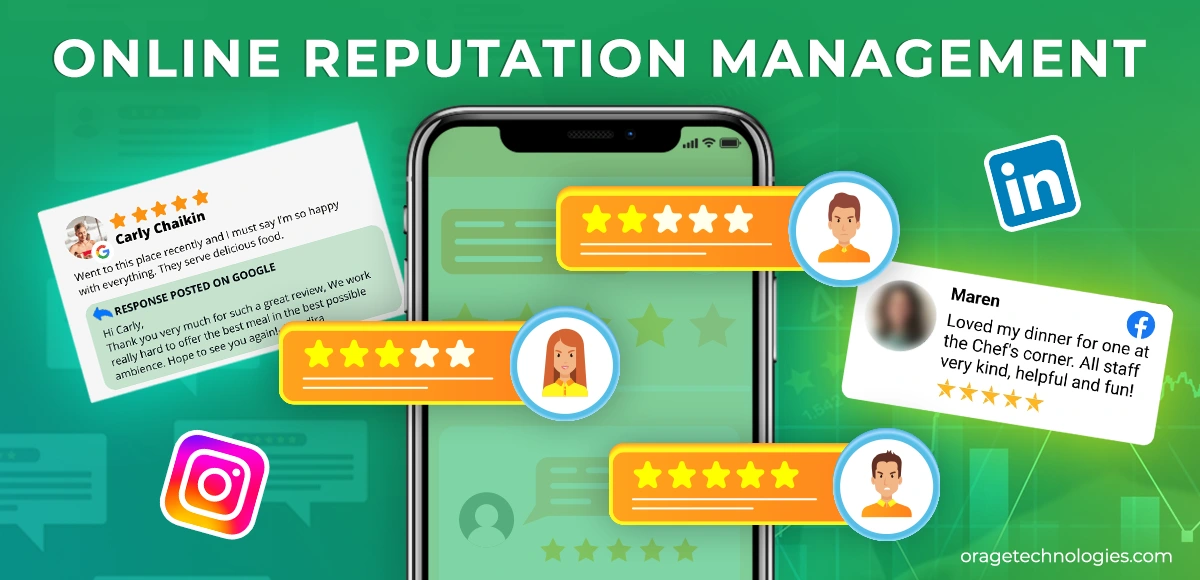
Divya Stuti, with over 5 years of experience in Digital Marketing & Content Writing, has a knack for turning complex Marketing strategies, trends, and jargon...
Reputation is no longer in the office, in your product, and even in your customer service desk; it is on the internet. Indeed, 91 per cent of the population reads a review online before purchase, and 3/4 rely on the reviews as much as a referral. A single Google search result or a comment on social media to just one star review can alter how you are perceived by thousands of potential customers.
This is the reason why Online Reputation Management (ORM) has developed as an essential component of business strategy. However, ORM is by no means limited to covering negative feedback and removing negative articles. When properly executed, it incorporates search engine optimization, social media monitoring, content strategy, customer outreach and risk control, so that not only can your brand survive the scrutiny of the internet, but prosper in it.
This guide takes an in-depth look at what ORM means, why it is important after all, how businesses can use it well, and what most plans still lack.
What is Online Reputation Management?
Managing and enhancing brand perceptions online is referred to as ORM. This practically implies:
- Search engine tracking of brand names.
- Review Management on websites such as Google, Yelp, and Advisor.
- Monitoring social media and internet social discussion.
- Putting up good news to bury the bad news.
Listening to customer opinions and responding swiftly and genuinely.
Consider Online Reputation Management a multi-channel strategy that exists in your owned media (such as your website and blog), your earned media (coverage by the press and by customers), your shared media (social networks), and your paid media (advertisements and paid content).
It is not only responding to issues. Great Online Reputation Management can also be proactive: accumulating good content and interaction in your digital estates to ensure that you are on the front foot going into things before they go wrong.
Why Does ORM Matter So Much?
My first impression is usually a good online reputation. Almost all clients look at reviews or Google before making a purchase. As a matter of fact, most of the consumers believe in online reviews just as they believe in personal recommendations.
Bad ORM may lose you customers, sales, and that even after a long time. Proper ORM, in turn, has potent advantages:
- Ups brand credibility and trust.
- Raises search engine rankings.
- Aid in the Handling and Surviving of the Crises.
- Creates more loyal customers.
Another aspect of ORM is closely related to SEO as well. This makes it overpower your site when negative contents turn up on the first page of search engines. The proper reputation-related approach will assist in guaranteeing that the positive and the brand-controlled content rises to the top and shapes the image.
Meanwhile, ORM is not only about visibility, but also about relations. Businesses do not need to be perfect according to their customers. The one thing that they do want is responsiveness. When someone complains or leaves a review, a well–thought–out response may result in her or him becoming a devoted follower.
The Elements of ORM
There are four pillars of strong ORM:
- Monitoring -Observing mentions, reviews, and search engine results using any monitoring tool available.
- Response Management- Response to feedback, both negative and positive.
- Content Strategy- Developing content that communicates your story in the form of blogs, social posts and press releases.
- Search Optimisation- This is the act of maintaining positive results to be more visible during searches over the negative ones.
With the use of technology, this is no longer a problem. Review management systems, AI-enhanced responses, sentiment analysis tools, and consolidated dashboards that consolidate all feedback in one platform are some of the newest business assets. The tools enable the brands to listen, understand, and respond in real time.
Technology is not enough, though. The tone, empathy, and consistency are also a part of ORM. All the messages that you send, be it a tweet, review response, or press release, are included in your reputation.
The Hidden Gaps in Most ORM Strategies
Although most people are conversant with the fundamentals of ORM, most companies continue to exhibit significant loss of touch in addressing the same. To understand why this is so significant, why not examine what is lacking:
1. Case Studies in the Real World
The majority of the advice on ORM is all about the definition and strategies, and seldom about evidence of success. The lack of practical examples of the case studies of businesses that reversed their reputation is what is being missed.
Such as how a hotel chain was able to change its TripAdvisor rating through changing its strategy behind reviews, and how a small retailer got out of a bad viral post. Such case studies would assist enterprises to understand what can be achieved and what other people have failed at and succeeded in.
2. Crisis Preparedness Playbook
Lots of companies recognise the necessity of ORM, yet very few produce an organised crisis scheme.
This is something every business ought to prepare:
- A ladder of crisis response that clarifies whether one should carry an issue to the PR or legal teams.
- An emergency response template that has been pre-approved.
- Defined guidelines on how to conduct business on social media when going viral with a negative tendency.
The businesses improvise under such pressure without preparation, which is a very risky business when a brand is trying to project its reputation.
3. Intense Reputation Monitoring
The majority of ORM deals with inward-looking monitoring by keeping your reviews and mentions. Customers also benchmark you against the competition every day.
Wise ORM plans must involve:
- Tracing of the competitor sentiment to get insight into how competitors are perceived.
- Seeking avenues where the reputation of the competitors is weak and convert it into your strength.
- Answering your industry in an industry conversation.
- The ORM will not only be a safeguard but also an advantage due to benchmarking against the competitors.
4. Premium AI, Fake Review Detection
Although AI has now penetrated ORM, its application remains very simple in most businesses, such as auto-reply or sentiment. The actual potential is:
- Artificial Intelligence reviews algorithms that identify suspicious patterns of reviews.
- Predictive analytics of warning and projecting an increase in negative sentiment.
- AI-powered recovery messages, which brands use at scale to create human-sounding response messages.
This reactive-to-predictive ORM transition has the potential to save companies’ brand names even prior to a reputational disaster.
5. Internal Alignment Employee Advocacy
Your people constitute one of the largest ORM opportunities that have not been tapped. A company can have the most genuine promoters in its employees.
Trust can be developed when they are encouraged to share their experience, to post about customer wins, or create a culture within the company, etc.
Meanwhile, it is essential to align internally. Training your workforce (in particular, the teams that deal with customers) on their communication skills in the online presentation will bring consistency. The marketing team is not the only one who should do the work of ORM; it is an enterprise-wide task.
Future of Online Reputation Management
The very nature of ORM is changing rapidly. It is no longer only about damage control. Rather, it is also turning into how to engage in conversations in an authentic manner and how to keep ahead of risks with the help of technology.
The future of Online Reputation Management will probably consist of:
- Combined dashboards that integrate SEO, social listening and review management.
- Predictive AI tools which identify the presence of a future crisis before it blows up.
- Sector-specific playbooks that are made according to industries such as healthcare, hospitality, or finance.
- More powerful employee advocate programs where ORM becomes an organisational culture.
The enterprises that live by these trends will not only preserve their reputation, but also enhance it beyond that of their competitors.
Final Thoughts
Online Reputation Management is not something one does anymore, but must. It will not be a project that will be completed once, but it will take some constant work, monitoring, participation, and wise approaches.Strong ORM builds trust, improves visibility, and ensures that when people search for your brand, they find the story you want them to see.
The basics—monitoring, responding, and optimising—are well understood. But the real breakthroughs will come from filling the gaps: adding real case studies, preparing structured crisis plans, tracking competitors, using advanced AI, and empowering employees.
Because at the end of the day, Online Reputation Management isn’t just about defending your reputation. It’s about building a brand people trust, respect, and choose—again and again.
Frequently Asked Questions:
- How to manage your online reputation?
Manage your online reputation by monitoring reviews, tracking mentions, responding quickly, creating positive content, and optimizing search results.
- What are the types of online reputation management?
ORM types include proactive strategies like SEO and content creation, and reactive ones like review handling, crisis management, and social listening.
- Which are the best Online reputation management tools?
ORM tools help monitor mentions, track reviews, analyze sentiment, and automate responses. Popular ones include Brand24, Google Alerts, and social dashboards.
Also Read: iOS 26 Public Beta is Here: The Biggest iPhone Redesign

Divya Stuti, with over 5 years of experience in Digital Marketing & Content Writing, has a knack for turning complex Marketing strategies, trends, and jargon into interesting and easy to digest blog posts. Whether she’s breaking down the SEO, Social Media or decoding campaigns, Divya knows how to make marketing feel exciting and easy to understand. Armed with a sharp eye for strategy and a storyteller’s instinct, she writes with clarity, creativity, and just the right dose of wit.
More Posts

